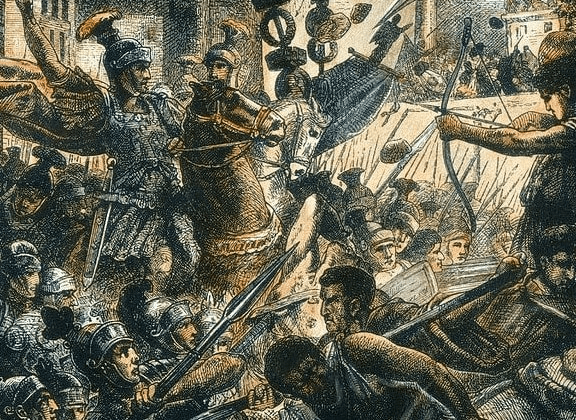There are three characteristics that most leaders have in common: pride, self-interest, and the ability to intimidate people. Many dictators are not born into a position of power. Instead, they often begin their ascent to sovereignty by climbing a ladder of power. Sulla, the first self-appointed Roman Dictator in Roman history, is a prime example of a man who was driven by a desire for power—he was willing to do anything to get to the top. Although Sulla originated from a minor Patrician family, he nevertheless knew that there was only one way to live comfortably in Roman life: through the acquisition of power.1 His talent as a military commander earned him fame and political power. With the assistance of more powerful mentors, the young soldier was given a wealth of advantages which he would use to propel himself through various political offices. Nothing could stop him from taking control of Rome, doing battle with a tyrant, and exterminating those who opposed him in order to carve his name into history.
Sulla Felix, or Sulla the Fortunate, as he referred to himself, began to climb the political ranks of the Cursus Honorum, or “Run of Offices,” as a Queastor, an administrator at the lowest level, in 107 BCE under the command of Gaius Marius. Marius had previously been Consul, the highest ranking magistrate in the Roman Republic, and was well-known for his role in the on-going Jugurthine War of 112 BCE. By the end of the war in 106 BCE, Sulla had earned respect from Marius, and his name was consequently spread throughout Rome. His newfound popularity earned him the valuable praise of the general populace, which allowed him to be elected to office again. However, this time he enjoyed the title of Praetor and was was able to lead a small army, which he used to ultimately become a high ranked officer, one with access to greater power, and a larger army. After returning to Rome, he was appointed governor or Cilicia. Later, he was the primary Roman commander during the Social War (91 BCE to 88 BCE), which began when other Italian cities wanted Roman Citizenship but were not given them. Amid the chaos, Sulla fought alongside Marius once more, further proving himself to be capable of leading an army on his own.2 After several years of battle, when the Romans extended citizenship to those who no longer fought against them, Sulla became a war hero.

Soon after he became a well-known war hero, he was elected Consul in the year 88 BCE. He hardly had time to settle into his office before Mithridates, the King of the Pontus, a region in Northeastern Asia Minor, or modern-day Turkey, began slaying Roman citizens in retaliation for Roman Expansion. When word of this slaughter reached Rome, the Senate ordered Sulla to lead an army against Mithridates.3 On his way to fight with Mithridates, Sulla got word that Marius and Rufus (another former general) had gone to meet with the Senate and objected that Marius should have commanded this army instead of Sulla. This angered Sulla, which made him turn his army around and march on Rome. Sulla attacked Marius, who escaped Sulla by leaving Rome for Africa.4 Rufus, however, was not so lucky and was killed by Sulla for deserting him. Sulla then returned to the task of fighting Mithridates for the murder of innocent Romans. When the smoke cleared, Sulla left Asia Minor victorious and returned to Rome. Prior to his return, Sulla had learned that Marius had allied with Cinna, a former Consul, to take control of Rome. The two had killed anyone who opposed them and had seized power in Rome as Consuls.5 As fate would have it, however, Marius would never have an opportunity to meet his peer on the battlefield. Instead, Marius died of old age before Sulla arrived in Italy, and Cinna was killed by his army shortly thereafter, prompting the election of new Consuls. Upon Sulla’s return in 82 BE, he was met in battle by Norbanus and Scipio Asiaticus, the new Consuls of Rome who had just been elected. Sulla’s army beat Norbanus fairly easily because his army had much more combat experience. After he defeated Norbanus, Sulla convinced Asiaticus’s men to join his side.6 In a final attempt to beat Sulla, the Senate appointed two new Consuls, one of which was Marius’s son, Marius Minor. Marius Minor was immediately sent to stop Sulla’s second march on Rome. Marius eventually realized that victory was impossible, he attempted to flee Rome, was caught, and committed suicide.

When Sulla returned to Rome, he took control of the government by force and had the Senate give him the title of “Dictator for Life.”7 Thus began Sulla’s reign with his loyal army. Those who opposed him or were accused of opposition were put to death. Sulla issued his famous proscription, which was a document that called for the death of hundreds–and perhaps thousands–of people who had opposed Sulla or had simply said anything against him. The Proscription kept people from opposing him by striking fear into those who might try to overthrow him. After Sulla had created the Proscription, he also formed a judicial body that was in charge of the list in order to make sure those on the list were executed. At the end of the purge, there were so few Senators left that Sulla was forced to assist them in order to get them to complete their job, which resulted in a political standstill: there were no laws being made and no names being added to the list.8

Sulla also decided to reform the Senate and Court System, and passed a law requiring individuals to have had prior experience in the government in order to hold office. He then split up the work for the two systems so they would have the equal amount of work. He figured that this would prevent another political standstill and that it would allow both parties the ability to focus on more cases. Sulla also ensured that nobody would be able to rise to power in the way that he did by reforming the Constitution to everyone that had wanted to become a Consul, Praetor, or higher had to serve in Rome. Once he had been in office for about two years, Sulla retired from being dictator, and was elected Consul for 80 BCE, for a final term. Sulla retired from politics after this consulship and lived the rest of his life out in Italy where he died in 78 BCE.9
- Badian, E. “Waiting for Sulla.” The Journal of Roman Studies 52 (1962): 47-61. doi:10.2307/297876, 49. ↵
- Frier, Bruce W. “Sulla’s Propaganda: The Collapse of the Cinnan Republic.” The American Journal of Philology 92, no. 4 (1971): 585-604. doi:10.2307/292665, 602. ↵
- Sherwin-White, A. N. “Ariobarzanes, Mithridates, and Sulla.” The Classical Quarterly 27, no. 1 (1977): 173-83. Http://www.jstor.org.blume.stmarytx.edu:2048/stable/638378, 173. ↵
- Badian, E. “Waiting for Sulla.” The Journal of Roman Studies 52 (1962): 47-61. doi:10.2307/297876, 57 ↵
- 2. Frier, Bruce W. “Sulla’s Propaganda: The Collapse of the Cinnan Republic.” The American Journal of Philology 92, no. 4 (1971): 585-604. doi:10.2307/292665, 558. ↵
- Badian, E. “Waiting for Sulla.” The Journal of Roman Studies 52 (1962): 47-61. doi:10.2307/297876, 60. ↵
- Badian, E. “Waiting for Sulla.” The Journal of Roman Studies 52 (1962): 47-61. doi:10.2307/297876, 60. ↵
- P. V. D. Balsdon. “Sulla Felix.” The Journal of Roman Studies 41 (1951): 1-10. http://www.jstor.org.blume.stmarytx.edu:2048/stable/298093, 4. ↵
- Badian, E. “Waiting for Sulla.” The Journal of Roman Studies 52 (1962): 47-61. doi:10.2307/297876, 61. ↵



11 comments
Charli Delmonico
This article contained so many major events! I’m almost amazed with how quickly Sulla was able to take power and how ferociously he fought those who opposed his rule. This article was incredibly interesting. I find it quite scary that Sulla was able to silence his opposition by simply making a list of everyone that “deserved” to de due to their disloyalty to him.